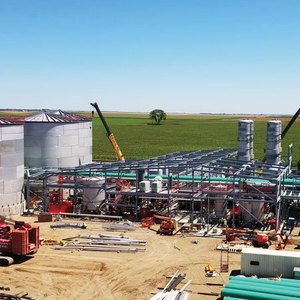New corn ethanol plant in South Dakota begins operations

PHOTO: Ringneck Enegy & Feed
June 27, 2019
BY Matt Thompson
After four years of construction and planning, Ringneck Energy & Feed’s ethanol plant in Onida, South Dakota has come online.
“It feels pretty good, that’s for sure, after kind of a long construction period,” said Walter Wendland, president, CEO and chairman of Ringneck Energy. “We did the dirt work in the fall and winter of ’15, and then the permitting process took a while,” he said. “We had to get our air permit before we could start actual construction, so we got our air permit in September of ’16 and then finished raising our equity in July of ’17.”
Advertisement
Advertisement
Wendland said the substantial completion document for the 80 MMgy plant was signed in May and the plant passed its performance test in early June of this year. “We still have a couple of minor calculations that are being redone on the system to help us optimize things a little better,” Wendland said. “But we’re running as fast as we can right now.”
Ringneck’s opening took place despite a challenging time for the industry. Ethanol producers dealing low margins industry-wide, and concerns about this year’s corn crop stemming from spring flooding in the Midwest places Ringneck in a unique situation.
“Thank goodness we’ve faired a little better than most maybe when it comes to corn planting,” Wendland said. While planting has been behind in the Onida area, recent weather has allowed area farmers to make up lost ground. “They did get in just in the nick of time when the weather has really cooperated since the first of June, so that’s helped,” he said.
Advertisement
Advertisement
Ringneck is designed to run more efficiently, Wendland said. He said while the plant doesn’t include much new equipment, it does incorporate “new designs to be more efficient.” He said Ringneck includes less piping and ductwork than other ICM-designed plants. “When they built the original plants, they really didn’t reengineer it, they just kind of used the same blueprint for all of them,” Wendland said. “So, this was ICM’s first chance to build a U.S. plant that they could redesign to be more efficient.”
Wendland added that the cost for the sprinkler system was kept low as well. “ICM plants always had ethanol within the process building and some places required full or partial sprinkling,” he said. “By relocating that part of the facility outside with the rest of the distillation, it helped keep our sprinkling cost down.”
Related Stories
Bangkok Airways Public Company Limited has officially announced the adoption of sustainable aviation fuel (SAF) on its commercial flights, reinforcing Thailand’s green aviation industry. The initiative took effect starting July 1, 2025.
Avalon Energy Group LLC and Sulzer Chemtech have signed a strategic alliance and partnership agreement to scale up the production of SAF. Under the agreement, Avalon has selected BioFlux technology for its portfolio of SAF projects.
Neste and DHL Express have strengthened their collaboration with the supply of 7,400 tons (9.5 million liters) of neat, i.e. unblended, Neste MY Sustainable Aviation Fuel to DHL Express at Singapore Changi Airport starting July 2025.
CoBank’s latest quarterly research report, released July 10, highlights current uncertainty around the implementation of three biofuel policies, RFS RVOs, small refinery exemptions (SREs) and the 45Z clean fuels production tax credit.
The U.S. Energy Information Administration maintained its forecast for 2025 and 2026 biodiesel, renewable diesel and sustainable aviation fuel (SAF) production in its latest Short-Term Energy Outlook, released July 8.
Upcoming Events










